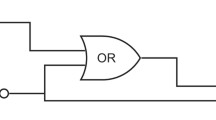
Overview
- Highlights the advantages of a quantum over a classical computer
- Reviews the concepts of the classical and quantum computers along with circuits and gates
- Uses the Deutsch, Grover, and Shor algorithms for highlighting key features of quantum computing
Access this book
Tax calculation will be finalised at checkout
Other ways to access
About this book
Similar content being viewed by others
Keywords
Table of contents (19 chapters)
-
Front Matter
-
Fundamentals
-
Front Matter
-
-
Quantum Algorithms
-
Front Matter
-
-
Applications
-
Front Matter
-
Authors and Affiliations
About the authors
Prof. Belal Ehsan Baaquie holds a B.S. in Physics from Caltech and a Ph.D. in Theoretical Physics from Cornell University, USA. His main research interest is in the study and application of the mathematical methods of quantum field theory. He has applied the mathematical formalism of field theory to finance and been a major contributor to the emerging field of quantum finance. His current focus is on develo** the formalism of quantum finance and applying it to option pricing, corporate coupon bonds, and the theory of interest rates, as well as the study of equity, foreign exchange, and commodities; he has developed forecasting models for commodity prices. He is also applying methodologies from statistical mechanics and quantum field theory to the study of microeconomics and macroeconomics.
Leong-Chuan Kwek is a principal investigator at the Center for Quantum Technologies, NUS, the Co-Director of the Quantum Science and Engineering Center at NTU and a faculty of the National Institute of Education, Singapore. He is the Immediate Past President of the Institute of Physics, Singapore and a Council Member of the Association of Asia Pacific Physical Socieites. He is also an elected Fellow of the American Associaiton for the Advancement of Science (AAAS) and the Institute of Physics, UK (IOP).
Bibliographic Information
Book Title: Quantum Computers
Book Subtitle: Theory and Algorithms
Authors: Belal Ehsan Baaquie, Leong-Chuan Kwek
DOI: https://doi.org/10.1007/978-981-19-7517-2
Publisher: Springer Singapore
eBook Packages: Physics and Astronomy, Physics and Astronomy (R0)
Copyright Information: The Editor(s) (if applicable) and The Author(s), under exclusive license to Springer Nature Singapore Pte Ltd. 2023
Hardcover ISBN: 978-981-19-7516-5Published: 04 January 2023
Softcover ISBN: 978-981-19-7519-6Published: 05 January 2024
eBook ISBN: 978-981-19-7517-2Published: 03 January 2023
Edition Number: 1
Number of Pages: XVI, 297
Number of Illustrations: 37 b/w illustrations, 44 illustrations in colour
Topics: Quantum Computing, Theory of Computation, Circuits and Systems, Quantum Physics



